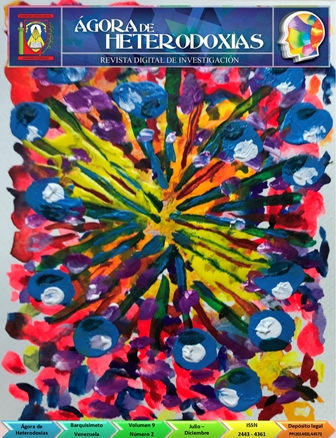Ecological Mind Is it possible to make an ecological commitment to the planet through interscience communication?
DOI:
https://doi.org/10.5281/zenodo.8422180Keywords:
Ecological Mind, interscience communication, Communicative actionAbstract
When we communicate, are we really communicating? Communication as a mean to transmit our ideas, opinions, moods, emotions, among other messages, is a skill that we develop as human beings throughout our lives. While it is true that we are constantly communicating through language (verbal, body or written), this communication is not always intelligent and effective; consequently, a gap is created between what we want to express and the way in which the message reaches the other person or persons.In science communication, in this particular case of the social sciences, there are also gaps, and we experience multiple disagreements as challenges to the claim in this encounter. The direction in that communicational encounter with that other is impregnated with the need to prove, justify and sometimes make the explanation inexhaustible in order to achieve understanding.
Downloads
References
Carvajal, B. (2007). Problemática Ambiental y Prospectiva. Uso de los métodos de planificación prospectiva ante las incertidumbres futuras en áreas rurales. Revista Estudios Iberoamericanos. 2 (1). / pp. 13-33.
Ernest, P. (1999). What is Social Constructivism in the psychology of mathematics education. Philosophy of Mathematics Education Journal, 12, pp. 42 – 67.
Popper, K. R. (2002) Conjectures and Refutations. The Growth of Scientific Knowledge. Routledge, United States.
Snow, C. P. (1995). As duas culturas e uma segunda leitura. Trad. Geraldo Gerson de Souza e Renato de Azevedo Resende Neto. São Paulo: EDUSP.
Vieira Ouriques, E. (2015). A teoria da gestão e a emancipação psicopolítica do sujeito do autocontrole contínuo e dos balanços anuais. Ágora de Heterodoxias, 1(2), 34-53. https://revistas.uclave.org/index.php/agora/article/view/257
Published
How to Cite
Issue
Section

This work is licensed under a Creative Commons Attribution-NonCommercial-ShareAlike 4.0 International License.
![]() Authors keep their copyrights so articles can be reused for teacher and research purpose. Readers and users can also reuse articles for the same purposes but not for commercial purposes. Ágora de Heterodoxias has no responsibility on information given by collaborators which is not necessarily the point of view of the publication
Authors keep their copyrights so articles can be reused for teacher and research purpose. Readers and users can also reuse articles for the same purposes but not for commercial purposes. Ágora de Heterodoxias has no responsibility on information given by collaborators which is not necessarily the point of view of the publication



